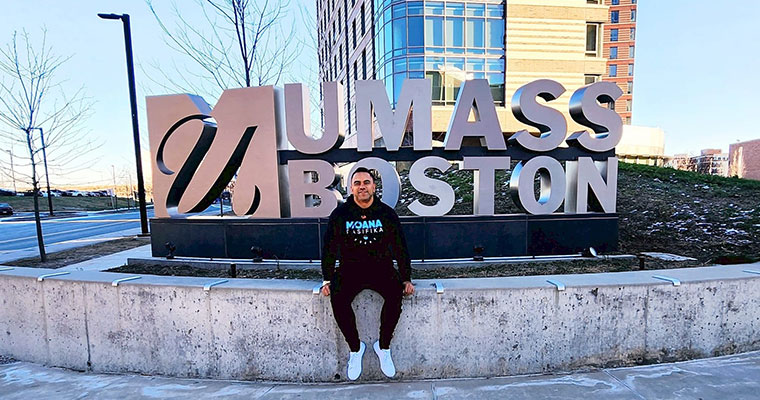- Home
- News
- Recent News
- Visiting Scholar Researches Indigenous Development
Visiting Scholar Researches Indigenous Development Among New Zealand, Native American Youth
Visiting Fulbright Scholar Dr. William Flavell hails from Aotearoa, the Māori name for New Zealand, and is this year’s sole recipient of the Fulbright-Ngā Pae o Te Māramatanga scholarship, which is given to outstanding Māori scholars who will conduct research at a U.S. institution in the field of indigenous development.

“ We can all benefit from indigenous knowledge and indigenous ways, because when indigenous people do well, everyone does well. ”
Flavell is conducting some of his research work at UMass Boston this spring, comparing the educational experiences of Native American youth with the experiences of Māori youth in New Zealand, where indigenous communities have long fought for cultural integration in the country’s education and government systems with positive results.
“As a result of the research, I hope to push the idea that we need to continue to challenge the mainstream system and ways of doing things,” he said. “We can all benefit from indigenous knowledge and indigenous ways, because when indigenous people do well, everyone does well”.
For his research, Flavell is connecting with local Native American tribes and historians to learn more about the high school experiences of Native American youth. In addition to conducting interviews with young adults between the ages of 18 and 24 to reflect on their personal schooling experiences, Flavell will also be looking into language revitalization programs and broadening his understanding of what value other indigenous communities put on education and what they would like to see in the mainstream education system.
“I’m a fluent language speaker of my own indigenous language, but I’m a second learner of the language,” he said. “I’m also here to share as much as I can from my research and personal experiences if that’s going to be of any help to local indigenous communities in Massachusetts. I want to give more than I take; I think it’s important that it’s reciprocal.”
Flavell arrived in Boston in December for a three-month stay starting with the Anthropology department at UMass Boston; he will finish his trip at UMass Amherst. He is working with Associate Professor of Anthropology Ping-Ann Addo and Senior Lecturer in Anthropology and Native American and Indigenous Studies Christopher Fung while he is on campus.
“Dr. Flavell is committed to the idea of building links between public institutions of higher education and sees great potential for further links between indigenous communities in Aotearoa and Massachusetts with UMass Boston as a key player,” Fung said.
“Back home in Aotearoa I work with Māori youth,” Dr. Flavell said. “I’m a former high school teacher, who taught the Māori language. I wanted to see if there were similarities or differences between the experiences of Māori youth in New Zealand and the indigenous youth here in Massachusetts.”
Growing up as a Māori youth, Flavell didn’t envision himself as an educator and had initially enrolled in a law program as a first-year undergraduate student. He later learned that half of Māori boys leave high school without any qualifications, leading to higher rates of unemployment, poor health status, and potentially higher rates of incarceration.
“A whole lot of negative steps can happen as a result of not achieving basic high school qualifications,” he said. “Seeing myself being one of the few Māori boys that perhaps made it, I thought, okay, I think I actually need to become a high school teacher.”
Flavell switched his degree from law to teaching and went on to be an educator for almost 11 years. He considers it one of the best decisions of his life and continues to work in education by advocating for Māori students and challenging the education system to ensure that it’s meeting the needs of Māori youth.
In New Zealand, Māori make up 17% of the population. The Te Tiriti o Waitangi, or the Treaty of Waitangi, signed in 1840 guarantees that Māori should always have access to their knowledge and language and that it be embedded into all systems, including health and law, within New Zealand. Most schools in New Zealand teach the Māori language, so both indigenous and non-indigenous students are learning the language, Flavell said.
“There are pockets of communities here that are working hard to reconnect with their native identity by supporting native language education programmes” he said. “For myself as Māori, I think that we have an obligation to support other indigenous communities around the world. My hope is that we can share what’s been beneficial to us in indigenous communities.
“Our research shows that when you’re strong in your identity or when there are opportunities to excel in your identity, you’re actually also excelling in school and the workforce,” he said. “We see the external positive outputs that come from being active in your culture.”
Flavell was interested in conducting his research at UMass Boston because of its standing as a public university that serves a mostly urban population. Since arriving in Boston, Flavell has also traveled cross country to learn more about Native American history, including a recent trip to Arizona, where he attended a Native American conference.
After his stay at UMass Boston, he’ll continue his travels across the U.S. to visit indigenous schools before heading back to New Zealand, where he’ll be working on a new journal article and speaking at a number of education conferences and high schools to share his experience and research as a Fulbright scholar.
“Being indigenous is a superpower,” he said. “I always say back home that being Māori is a superpower. If we use our culture in a positive and affirmative way, we can get ahead. As an indigenous person, I want to encourage our young people to be confident in who they are”.
